
"I'll Be There for You" is a song by American pop rock duo the Rembrandts. The song was written by David Crane, Marta Kauffman, Michael Skloff, and Allee Willis as the main theme song to the NBC sitcom Friends, which was broadcast from 1994 to 2004. American rock band R.E.M. was originally asked to allow their song "Shiny Happy People" to be used for the Friends theme, but they turned the opportunity down. "I'll Be There for You" was subsequently written and Warner Bros. Television selected the only available band on Warner Bros. Records to record it: the Rembrandts. In 1995, after a Nashville radio station brought the song to mainstream popularity, Rembrandts members Danny Wilde and Phil Sōlem expanded the theme song with two new verses and included this version on their third studio album, L.P. (1995).

"Gonna Fly Now", also known as "Theme from Rocky", is the theme song from the movie Rocky, composed by Bill Conti with lyrics by Carol Connors and Ayn Robbins, and performed by DeEtta West and Nelson Pigford. Released in 1976 with Rocky, the song became part of 1970s American popular culture after the film's main character and namesake Rocky Balboa as part of his daily training regimen runs up the 72 stone steps leading to the entrance of the Philadelphia Museum of Art in Philadelphia and raises his arms in a victory pose, while the song plays. The song was written in Philadelphia. The song is often played at sporting events, especially in Philadelphia. Most notably, the Philadelphia Eagles play the song before the opening kickoff of every home game at Lincoln Financial Field.

"TSOP (The Sound of Philadelphia)" is a 1974 recording by MFSB featuring vocals by The Three Degrees. It was written by Gamble and Huff as the theme for the American musical television program Soul Train, which specialized in African American musical performers. The single was released on the Philadelphia International Records label. It was the first television theme song to reach No. 1 on the Billboard Hot 100.
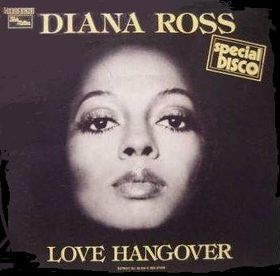
"Love Hangover" is a song by the Motown singer Diana Ross, recorded in 1975 and released as a single on March 16, 1976. It rose to number one on the Billboard Hot 100 and Hot-Selling Soul Singles. It also hit number one on the Record World disco charts.

"Theme from Mahogany" is a song written by Michael Masser and Gerry Goffin and produced by Masser. It was initially recorded by American singer Thelma Houston in 1973, and then by Diana Ross as the theme to the 1975 Motown/Paramount film Mahogany that also starred Ross. The song was released on September 24, 1975 by Motown Records as the lead single for both the film's soundtrack and Ross' seventh studio album, Diana Ross. Masser and Goffin received a nomination for Best Original Song at the 48th Academy Awards. Also, the song was nominated for AFI's 100 Years...100 Songs list constructed by the American Film Institute in 2004.

"True Love" is a popular song written by American songwriter Cole Porter, published in 1956. The song was introduced by Bing Crosby and Grace Kelly in the musical film High Society. "True Love" was nominated for the Academy Award for Best Original Song. Kelly's contribution on the record is relatively minor, duetting with Crosby on only the final chorus. Nonetheless, the single is co-credited to her.
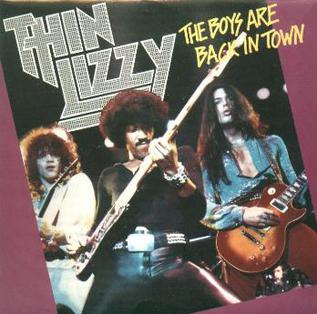
"The Boys Are Back in Town" is a song by Irish hard rock band Thin Lizzy. The song was originally released in 1976 as the first single from their album Jailbreak. It is considered by Rolling Stone to be the band's best song, placing it at No. 272 on the 2021 edition of the "500 Greatest Songs of All Time" list.

"December, 1963 " is a song originally performed by the Four Seasons, written by original Four Seasons keyboard player Bob Gaudio and his future wife Judy Parker, produced by Gaudio, and included on the group's album Who Loves You (1975).

"More, More, More" is a song written by Gregg Diamond and recorded by American artist Andrea True. It was released in February 1976 as the first single from her debut album by same name (1976), becoming her signature track and one of the most popular songs of the disco era. In the US, it reached number four on the Billboard Hot 100 and spent three weeks at number three on the Cash Box chart in July of that year. In Canada it was a number one hit, and reached number five in the UK.
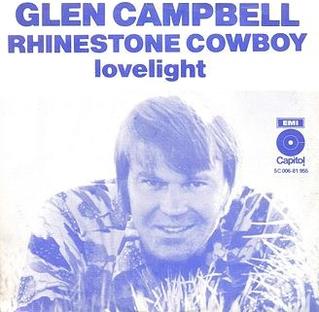
"Rhinestone Cowboy" is a song written and recorded by Larry Weiss in 1974, then popularized the next year by American country music singer Glen Campbell. When released on May 26, 1975, as the lead single and title track from his album Rhinestone Cowboy, it enjoyed huge popularity with both country and pop audiences.
"The Chain" is a song by British-American rock band Fleetwood Mac, released on their 1977 album Rumours. It is the only song from the album with writing credits for all five members.

"If You Asked Me To" is a song written by American songwriter Diane Warren and produced by Stewart Levine and Aaron Zigman. It was originally recorded by American singer Patti LaBelle for her ninth studio album, Be Yourself (1989), and also for the soundtrack to the James Bond film Licence to Kill. The song was released as the soundtrack's second single on June 12, 1989 by MCA Records. The lyrics are from the point of view of a woman who pleads to her significant other: "If you asked me to, I just might change my mind, and let you in my life forever". Three years later, Canadian singer Celine Dion covered the song for her 1992 self-titled second English-language studio album. Released as the album's second single, Dion's version topped the Canadian charts and peaked at number four on the US Billboard Hot 100.
Pratt & McClain was an American musical duo known originally called Brother Love consisting of Jerry McClain and Truett Pratt, along with various sidemen. They scored a Billboard No. 5 hit in 1976 with "Happy Days", the theme to the sitcom of the same name, written and performed in a nostalgic 1950s rock and roll style. It was their only success, making them a one-hit wonder.

"Summer Breeze" is a song written and originally recorded by American soft rock duo Seals and Crofts. It is the title track of their fourth studio album, and was released as the album's lead single in August 1972. The song reached No. 6 on the Billboard Hot 100 chart in the US. In 2013, it was ranked No. 13 in Rolling Stone′s "Best Summer Songs of All Time". The song also became a hit for the Isley Brothers in 1974.
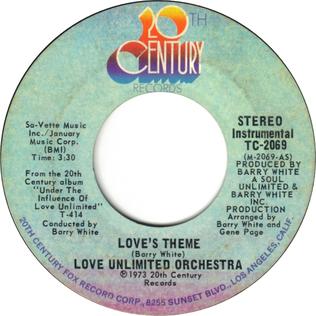
"Love's Theme" is an instrumental piece written by Barry White around 1965. Recorded and released as a single by White's Love Unlimited Orchestra in 1973, it was one of the few instrumental and purely orchestral singles to reach #1 on the Billboard Hot 100 chart in the United States, which it did in early 1974. Billboard ranked it as the #3 song for 1974.
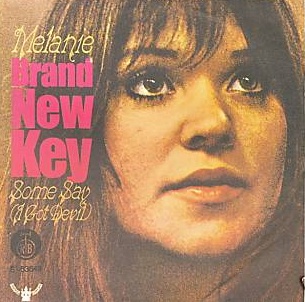
"Brand New Key" is a pop song written and sung by American folk music singer Melanie. Initially a track of Melanie's album Gather Me, produced by Melanie's husband Peter Schekeryk, it was known also as "The Rollerskate Song" due to its chorus. It was her greatest success, scoring No. 1 on the Billboard Hot 100 singles chart during December 1971 and January 1972. Billboard ranked it as the No. 9 song of 1972. It also scored No. 1 in Canada and Australia and No. 4 on the UK Singles Chart.

"Theme from S.W.A.T." is an instrumental song written by Barry De Vorzon and performed by American funk group Rhythm Heritage, released on their debut album Disco-Fied. It reached number one on the Billboard Hot 100 singles chart in the United States on the chart date of February 28, 1976.
"Wild One" or "Real Wild Child" is an Australian rock and roll song written by Johnny Greenan, Johnny O'Keefe, and Dave Owens. While most sources state that O'Keefe was directly involved in composing the song, this has been questioned by others. Sydney disc jockey Tony Withers was credited with helping to get radio airplay for the song but writer credits on subsequent versions often omit Withers, who later worked in the United Kingdom on pirate stations Radio Atlanta and, as Tony Windsor, on Radio London.

"Then You Can Tell Me Goodbye" is a song written by John D. Loudermilk. It was first released in 1962 by Don Cherry, as a country song and again as a doo-wop in 1967 by the group The Casinos on its album of the same name, and was a number 6 pop hit that year. The song has since been covered by Eddy Arnold, whose version was a number 1 country hit in 1968, and by Neal McCoy, whose version became a Top 5 country hit in 1996.
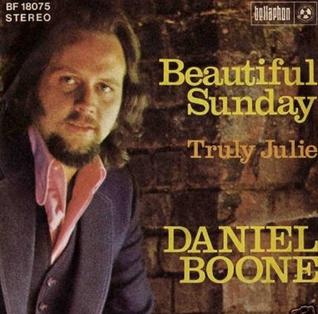
"Beautiful Sunday" is a song written by Daniel Boone and Rod McQueen and performed by Boone. It appeared on his 1972 album Beautiful Sunday and was produced by Larry Page and arranged by Boone.

















